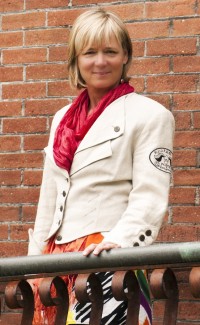Q&A: The Glass Harmonica
Dorothee Kocks is the author of three books, the historical novel The Glass Harmonica, A sensualist’s tale; its companion non-fiction ebook, Such Were My Temptations: Bawdy Americans, 1760-1830; and the academic book Dream a Little. She holds a PhD in American Studies from Brown University and has worked variously as a kitchen hand in Alaska, an accordion player and performance artist, and a history professor at the University of Utah. Read a profile of Dorothee by Elaine Jarvik in The Salt Lake Tribune.
Your book is set in the past but it doesn’t feel antiquarian.
Ultimately, it’s about secrets in a marriage. People lie to each other in the most intimate ways, often without quite knowing why. This has always been true.
What was the most fun part of writing the book?
I loved that Chjara was so immodest. I thought of her as America’s first pop star. Most people have never heard of the glass harmonica today but it was all the rage in the late 1700s. Women swooned hearing it. Mesmer mesmerized patients with it. And ministers preached against it just as they would against rock music 150 years later. One poet called the experience ‘celestial ravishment’ and you had to be very, very careful with ravishment in those days… just like today, come to think of it.
What about Henry, Chjara’s husband? He’s famous too, though secretly.
Yes, I like to say that Henry was America’s first pornographer – although that word didn’t come into existence until later. Still, it was people like Henry — sellers of risqué literature, of Nantucket ‘he’s-at-homes’ — who laid the groundwork. What’s a ‘he’s at home’? Ask a lonely whaler’s wife, stuck on Nantucket island for months, for years at a time. Henry was in many ways the most fun character to write. He’s both so naïve and so intense. He loves Chjara and he has no idea how deeply he will betray her. He does it with the best of intentions.
You’re a trained historian. Did you always intend to write a historical novel?
Not really. I go to the past because I’m interested in the human condition. What was it like to live through the first American sexual revolution? During the revolutionary era, between thirty and forty per cent of brides were pregnant when they got married. Premarital sex was rampant among these sons and daughters of Puritans. There’s a great book about this called The Sexual Revolution in Early America by Richard Godbeer.
Was life back then really as you depict it?
The Victorian writers convinced us that the Puritans and New Englanders in general were uptight. I don’t buy it. I mean, your typical social evening in the 1790s, early 1800s, was a ‘singing school’ night at the tavern, which was supposed to teach young men and young women the right words for church on Sunday, but the taverns were warm, they were crowded, the beer was flowing, and everyone was single. Does this sound chaste? In ‘shape-note singing’, men and women were arranged in a tight square with a teacher squashed in the middle — and they would shout the notes at each other. The whole body would vibrate.
There’s a lot of music in The Glass Harmonica. Talk about that.
The heart-springs of this book are from my own experience with altered states through music and chanting. I play the accordion — not generally considered a transporting instrument, but strap one on and feel the bellows against your chest — you’ll never be the same. As for chanting, I listen more than I do it, but there was one unforgettable moment: at Burning Man, the art and love fest in the desert. A man appeared in the hot noonday sun and led about fifty of us in a ‘monkey chant’. We’re sitting, sagging in the heat, spraying each other with mist to stay conscious, and he starts making monkey sounds, ‘oo-oo-ah-ah.’ He gets first one group and then another to imitate him, ‘oo-oo-oo-oo, ah-ah-ah-a’ — you have to be willing to go with it — and inside of five minutes, we find ourselves in this complicated, syncopated rhythm, breathing hard, breathing hot, the sound reverberating around us and through us… amazing.
Did the book change as your characters evolved on the page?
The erotic business that Henry begins was the big surprise of the book for me. I had no premonition of that. The idea for the book came to me one day in the Salt Lake City library. I was looking for an accordion CD and stumbled on a glass harmonica one instead. As I looked out the window I saw what would become the last scene of the book: shards of colored glass on a mountainside. It took about eight years to get from here to there, and somewhere along the way Henry startled me with his burgeoning interest in a ‘science’ of sexual knowledge.
What was it like to finish the book?
Terrible! I was overcome with grief — another surprise. I thought I’d be exhilarated to write ‘the end’. Instead, it was like leaving home. I can never go back there again.
Speaker
Dorothee speaks regularly to public and academic audiences. Dorothee also loves to visit book clubs, in person or by Skype. To learn more or inquire about available dates, please use the contact form above right.
 Creative Coach
Creative Coach
If you have a day job, you know it’s hard to fulfill other goals like writing a book. Dorothee works with a few clients a year to help them complete projects.
To learn more about Dorothee’s coaching services, please use the contact form above right.
 Book Club Lover
Book Club Lover
Dorothee loves to visit book clubs, in person or by Skype. To learn more or inquire about available dates, please use the contact form above right.









